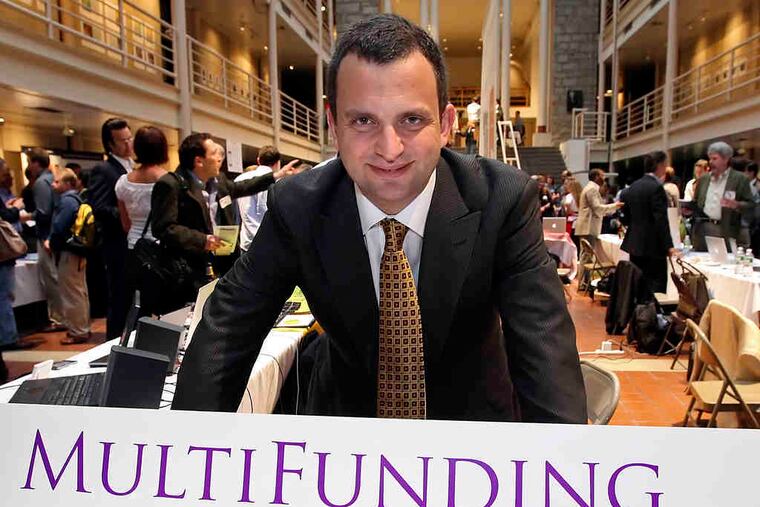PhillyDeals: Analyst: '1-to-3 shot' to legalize online poker
A late attempt in the lame-duck Democratic Congress to legalize online poker betting has only "a one-in-three shot" of passing, analyst Brian McGill, of Philadelphia-based Janney Capital Markets, told clients Monday, after checking his Washington contacts.

A late attempt in the lame-duck Democratic Congress to legalize online poker betting has only "a one-in-three shot" of passing, analyst Brian McGill, of Philadelphia-based Janney Capital Markets, told clients Monday, after checking his Washington contacts.
"Negotiations are very active," hedged another Washington-watcher, analyst Edward Mills, of Arlington-based FBR Capital Markets.
Online gambling, currently and illegally practiced by Americans on offshore websites, could go legit under a poker proposal pushed by Senate Majority Leader Harry Reid (D., Nev.) and his friends in corporate gambling.
Under Reid's plan, as described by McGill and Mills, U.S. casino and racetrack operators would be first to get the lucrative online betting licenses.
States would have the option of trying to ban betting sites, but they'd be lured in with a promise of 14 percent of the betting take, with another 6 percent for Uncle Sam.
Sounds "good for gambling companies, but also bad for [real-life] casino prospects" and jobs, Dan Fee, former spokesman for the group that recently opened the SugarHouse Casino in Fishtown, told me.
Some powerful Republicans - Senate whip John Kyl (R., Ariz.), House Banking Committee chairman-in-waiting Spencer Bachus (R., Ala.), House Ways and Means boss-apparent Dave Camp (R., Mich.) - oppose the bill.
But Senate Republican leader Mitch McConnell (R., Ky.) is a "wild card," according to Mills. McConnell's beholden to his state's "vibrant horse-track industry," and it "could become difficult for him to oppose it," said Mills. That's why "He has avoided taking a strong stance [so far]."
Closer to home, Pennsylvania's gambling industry is wondering what impact last month's failure by Harrah's owner Caesars Entertainment to help its private-equity investors sell shares to the public, at an offering price of $15-$17, will have on its prospects for managing the long-delayed Foxwoods casino in South Philadelphia.
Caesars and its Harrah's casinos are already loaded down with more than $20 billion in debt. If the equity value of the group has fallen, will it be able to get additional credit to finance projects like Foxwoods?
The IPO failure brings "no change in Caesars Entertainment's interest or ability to contribute and manage development projects," asserts company spokeswoman Jacqueline Peterson.
Paycheck mortgage
Ami Kassar is tired of saying no.
"We have the misfortune of telling dozens of entrepreneurs and small-business owners every week that they don't have sufficient collateral to get a loan and jump-start their dreams," the founder of Plymouth Meeting-based loan-screener MultiFunding L.L.C., of Fort Washington, complained this past weekend.
Kassar, a former Advanta Corp. executive, wants the United States to give lenders the right "to take an ongoing percentage of the borrower's [future] earnings until the obligation is paid off. We could use mechanisms and infrastructure that we use to enforce child-support payments to get the job done."
The suggestion, posted on multifunding.com, has sparked fascinating and fearful replies from business borrowers and loan pros. Kassar says he's going to keep pushing: "Our lending system is in desperate need of innovation."
Pump it up
West Chester University says it has received "the largest grant in its history - $4.7 million, from the U.S. Department of Energy. The money would be used to expand WCU's geothermal energy network from 13 dorms and a classroom building to 1,200 wells and four miles of pipes connecting 25 buildings to warm water from 400 feet down to heat and cool a total of 25 campus buildings.
The completed system will save $1 million a year, or 40 percent from the present campus heating bill and 20 percent from the air-conditioning tab, enabling West Chester to shut its coal-and-oil-burning central heating plant, according to a statement by Greg Cuprak, facilities chief at the state-backed school.
West Chester has not yet hired contractors for the job, spokeswoman Anna Iredale told me.